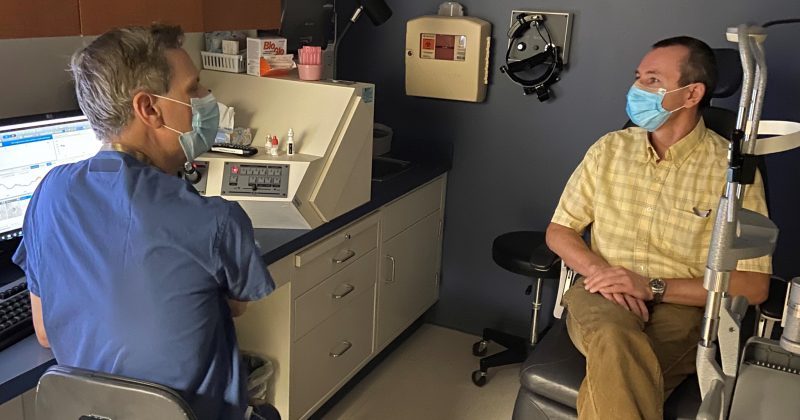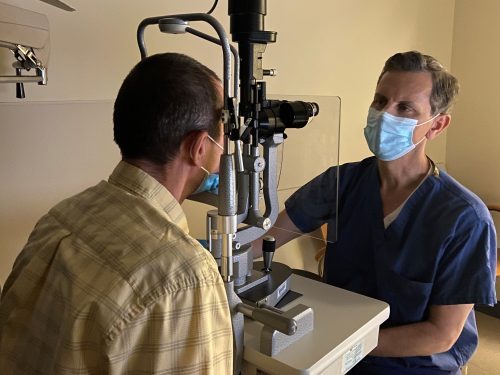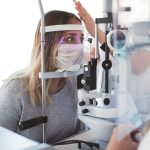The ongoing COVID-19 pandemic has affected U.S. healthcare in ways never seen before. One unfortunate result is that people have delayed medical care. Focus spoke with David S. Friedman, MD, PhD, on why people with glaucoma or other vision issues should not skip or delay their appointments.
A large percentage of people are cancelling or putting off medical care due to COVID-19 concerns. Dr. Friedman, director of the Glaucoma Service at Mass Eye and Ear, says it’s vitally important to stay on top of your preventive eye exams and for those diagnosed with vision issues, treatment visits. This is especially true for patients with glaucoma, he told Focus.
[Watch this video with Dr. Friedman explaining the importance of glaucoma screenings]
Glaucoma is a group of eye diseases that damage the optic nerve, resulting in vision loss. Although it is a leading cause of blindness in the United States, vision loss can often be slowed or stopped if the disease is diagnosed and treated early.
However, people with glaucoma often don’t show symptoms. Fifty percent of those with this condition don’t even know they have the disease, according to the National Eye Institute.
“One of the problems with glaucoma, is it tends to get worse gradually, which can be difficult for patients to detect. They can’t feel the changes in eye pressure or their condition worsening from one day to the next, which is why glaucoma is referred to as the ‘silent thief’ of sight,” he said. “Unfortunately, untreated glaucoma leads to vision damage that cannot be reversed. When we catch glaucoma early, we stand a much better chance of preserving vision.”
Untreated Glaucoma Leads to Vision Loss through Optic Nerve Damage

Glaucoma effects about 3 million Americans, and is the second-leading cause of blindness worldwide. The causes of glaucoma are unknown, but the risk of the disease increases with age. However, people of all ages — even young children — can have glaucoma. Groups at the highest risk for glaucoma include African Americans over 40 years old, all adults over age 60, people with a family history of glaucoma, and people with diabetes.
People with glaucoma can benefit from treatments such as eye drops and other procedures that reduce eye pressure to help slow the disease and preserve vision. For some cases and types of glaucoma, people may require surgeries or laser procedures.
Having perfect vision and no obvious symptoms of eye problems does not mean you don’t have glaucoma. The only way to find out definitively is through a comprehensive vision exam, according to Dr. Friedman. During an eye exam, an ophthalmologist will look inside the eye using a non-invasive lens. If the doctor sees nerve damage, he or she will do additional testing, such as measuring side vision with a special machine. Glaucoma researchers, including those at Mass Eye and Ear, are investigating other diagnostic tools to catch glaucoma such as laser devices that can scan the eye for disease.
If diagnosed with glaucoma, regular eye exams with a specialist are required on a schedule your care team will determine.
“Glaucoma typically gets worse in the vast majority of people slowly, on average over 20 years, but with some people, vision can decline very quickly. The way to think of most glaucoma visits are screening exams to make sure your eye sight and condition are not getting worse,” said Dr. Friedman. “Unfortunately, as a result of the COVID-19 pandemic, some patients have had glaucoma worsening due to delays in their care.”
Any Type of Vision Difficulty can Affect Quality of Life

Any vision problem can have a major impact on a person’s life and should prompt them to get a vision test as soon as possible, said Dr. Friedman. People with less than perfect vision may have difficulty functioning in the world. Low vision can lead to reduced social interactions (even virtually through platforms like Zoom), an increased risk for falls, problems with independence, and depression. The good news is that many vision issues can be resolved, some just requiring glasses, with regular eye exams.
“Some people have put off doctor visits, thinking they feel good overall so it won’t have a huge impact on their health and lives,” said Dr. Friedman. “But there’s more to an eye exam than other routine types of care. If you’re noticing issues with your vision, it’s something that we can treat, which will make a major difference in your everyday life.”’
Mass Eye and Ear has added virtual eye clinics on Saturdays in an effort to accommodate patients. Find out more information on glaucoma care and virtual visits at Mass Eye and Ear.
About Our Expert
 David S. Friedman, MD, PhD, MPH, is the Director of the Glaucoma Service at Mass Eye and Ear, who specializes in treating all forms of glaucoma for adults. Dr. Friedman sees patients at Mass Eye and Ear, Main Campus in Boston.
David S. Friedman, MD, PhD, MPH, is the Director of the Glaucoma Service at Mass Eye and Ear, who specializes in treating all forms of glaucoma for adults. Dr. Friedman sees patients at Mass Eye and Ear, Main Campus in Boston.




Thank you for the information Dr. Friedman has provided on this website!
I will be 81 yrs. old this month. Both my mother and grandmother were operated on at Mass Eye and Ear many years ago due to glaucoma. My sight is dereasing due to age related dry Macular Degeneration diagnosed about 5 yes. ago by my ophthamologist who requires that I also see a specialist. I have seenDr. Young at
MEandE and have a second appountment in Feb. 2021. Am I correc to assume that despite the strong family history of glaucoma, I don’t
need to do anything else for the time being.
Thank you so much!
Maryann
Hi Maryann, thanks for reading and your comment, we’ll pass along your thanks to Dr. Friedman too! We can’t give specific medical advice over the blog unfortunately, but glad to hear you have an upcoming appointment at Mass Eye and Ear where you can get some more answers.
I totally agree when you said that a person’s life can be affected no matter what type of vision problem they might have, so getting a medical eye exam is a must as soon as possible. I should look for a clinic to go to this weekend to get myself checked for the first time. And I am already 30, so I should start being proactive about my health to prevent severe illnesses as I get older.